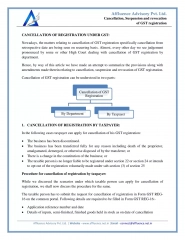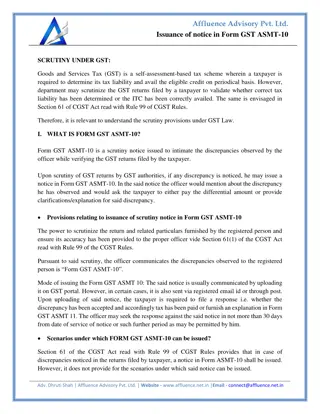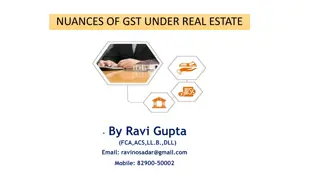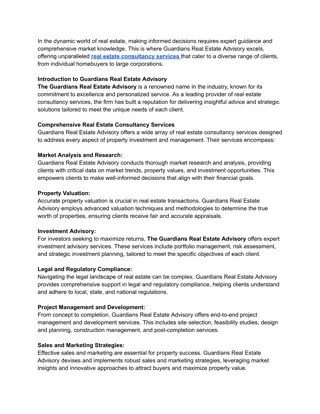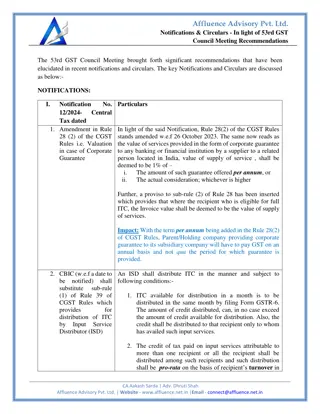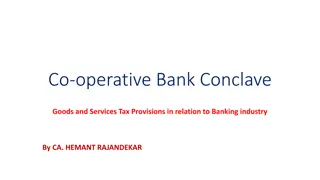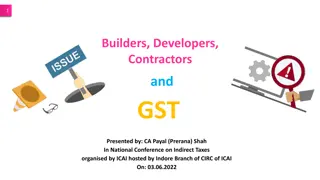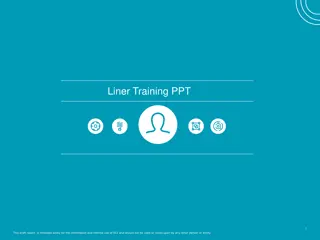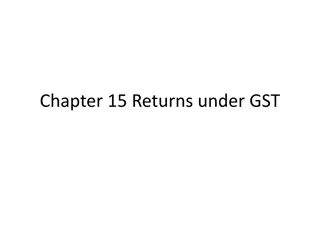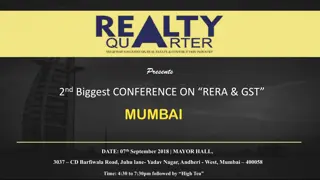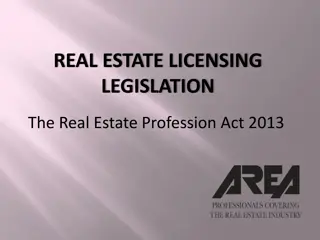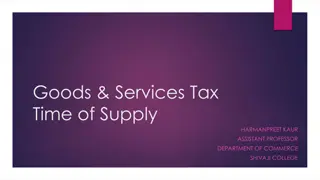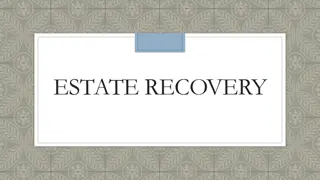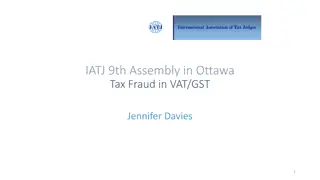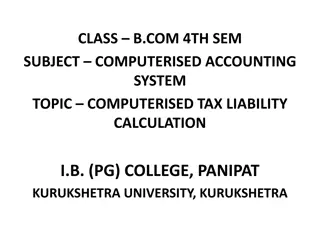Understanding GST Issues in Real Estate Sector
Explore the implications of taxable supply under GST in the real estate sector, various tax rates, input tax credit mechanisms, and anti-profiteering measures. Delve into the fundamental concepts of GST Act and activities treated as supply under different schedules.
Download Presentation

Please find below an Image/Link to download the presentation.
The content on the website is provided AS IS for your information and personal use only. It may not be sold, licensed, or shared on other websites without obtaining consent from the author. Download presentation by click this link. If you encounter any issues during the download, it is possible that the publisher has removed the file from their server.
E N D
Presentation Transcript
GST- Issue in Real Estate Sector
Meaning of Taxable Supply under GST Issue related to taxability of real estate sector Various Rates on Real estate sector under GST Mechanism of Input Tax Credit under Real Estate Sector Anti-Profiteering for Real Estate Sector
Meaning of Taxable Supply Section 7 + Schedule 1 Schedule 3 Section 11 (Notification No 12/2017)
Basic Fundamental of GST 7. (1) For the purposes of this Act, the expression supply includes (a)all forms of supply of goods or services or both such as sale, transfer, barter, exchange, license, rental, lease or disposal made or agreed to be made for a consideration by a person in the course or furtherance of business; (b)import of services for a consideration whether or not in the course or furtherance of business; (c)the activities specified in Schedule I, made or agreed to be made without a consideration; and (d)the activities to be treated as supply of goods or supply of services as referred to in Schedule II.
Basic Fundamental of GST Schedule-I
Basic Fundamental of GST ACTIVITIES TO BE TREATED AS SUPPLY EVEN IF MADE WITHOUT CONSIDERATION 1. Permanent transfer or disposal of business assets where input tax credit has been availed on such assets. 2. Supply of goods or services or both between related persons or between distinct persons as specified in section 25, when made in the course or furtherance of business: Provided that gifts not exceeding fifty thousand rupees in value in a financial year by an employer to an employee shall not be treated as supply of goods or services or both.
Basic Fundamental of GST 3. Supply of goods (a)by a principal to his agent where the agent undertakes to supply such goods on behalf of the principal; or (b)by an agent to his principal where the agent undertakes to receive such goods on behalf of the principal. 4. Import of services by a taxable person from a related person or from any of his other establishments outside India, in the course or furtherance of business.
Schedule II 5. Supply of services The following shall be treated as supply of service, namely: (a) renting of immovable property; (b) construction of a complex, building, civil structure or a part thereof, including a complex or building intended for sale to a buyer, wholly or partly, except where the entire consideration has been received after issuance of completion certificate, where required, by the competent authority or after its first occupation, whichever is earlier.
Basic Fundamental of GST Explanation. For the purposes of this clause (1) the expression "competent authority" means the Government or any authority authorized to issue completion certificate under any law for the time being in force and in case of non-requirement of such certificate from such authority, from any of the following, namely: (i) an architect registered with the Council of Architecture constituted under the Architects Act, 1972; or (ii) a chartered engineer registered with the Institution of Engineers (India); or (iii)a licensed surveyor of the respective local body of the city or town or village or development or planning authority; (2) the expression "construction" includes additions, alterations, replacements or remodelling of any existing civil structure;
Basic Fundamental of GST Schedule III ACTIVITIES OR TRANSACTIONS WHICH SHALL BE TREATED NEITHER AS A SUPPLY OF GOODS NOR A SUPPLY OF SERVICES 1. Services by an employee to the employer in the course of or in relation to his employment. 2. Services by any court or Tribunal established under any law for the time being in force. 3. (a) the functions performed by the Members of Parliament, Members of State Legislature, Members of Panchayats, Members of Municipalities and Members of other local authorities; (b)the duties performed by any person who holds any post in pursuance of the provisions of the Constitution in that capacity; or
Basic Fundamental of GST (c) the duties performed by any person as a Chairperson or a Member or a Director in a body established by the Central Government or a State Government or local authority and who is not deemed as an employee before the commencement of this clause. 4. Services of funeral, burial, crematorium or mortuary including transportation of the deceased. 5. Sale of land and, subject to clause (b) of paragraph 5 of Schedule II, sale of building. 6. Actionable claims, other than lottery, betting and gambling. Explanation. For the purposes of paragraph 2, the term "court" includes District Court, High Court and Supreme Court.
Section 11 - Power to grant exemption from tax. (1) Where the Government is satisfied that it is necessary in the public interest so to do, it may, on the recommendations of the Council, by notification, exempt generally, either absolutely or subject to such conditions as may be specified therein, goods or services or both of any specified description from the whole or any part of the tax leviable thereon with effect from such date as may be specified in such notification. Explanation. For the purposes of this section, where an exemption in respect of any goods or services or both from the whole or part of the tax leviable thereon has been granted absolutely, the registered person supplying such goods or services or both shall not collect the tax, in excess of the effective rate, on such supply of goods or services or both.
Basic Fundamental of GST (119) workscontract means a contract for building, construction, fabrication, completion, erection, installation, fitting out, improvement, modification, repair, maintenance, commissioning of any immovable property wherein transfer of property in goods (whether as goods or in some other form) is involved in the execution of such contract; renovation, alteration or
Notification No. 12/2017 Clause 3 Pure services (excluding works contract service or other composite supplies involving supply of any goods) provided to the Central Government, State Government or Union territory or local authority or a Governmental authority by way of any activity in relation to any function entrusted to a Panchayat under article 243G of the Constitution or in
Notification No. 12/2017 Clause 10 Services provided by way of pure labour contracts of construction, erection, commissioning, installation, completion, fitting out, repair, maintenance, renovation, or alteration of a civil structure or any other original works pertaining to the beneficiary-led individual house construction or enhancement under the Housing for All (Urban) Mission or Pradhan Mantri Awas Yojana.
Notification No. 12/2017 Clause 11 Services by way of pure labour contracts of construction, erection, commissioning, or installation of original works pertaining to a single residential unit otherwise than as a part of a residential complex. Clause 12 Services by way of renting of residential dwelling for use as residence.
Notification No. 12/2017 Clause 13 Services by a person by way of- (a) ... (b) renting of precincts of a religious place meant for general public, owned or managed by an entity registered as a charitable or religious trust under section 12AA of the Income-tax Act, 1961 (hereinafter referred to as the Income-tax Act) or a trust or an institution registered under sub clause (v) of clause (23C) of section 10 of the Income-tax Act or a body or an authority covered under clause (23BBA) of section 10 of the said Income-tax Act: Provided that nothing contained in entry (b) of this exemption shall apply to,- (i) renting of rooms where charges are one thousand rupees or more per day; (ii) renting of premises, community halls, kalyanmandapam or open area, and the like where charges are ten thousand rupees or more per day; (iii) renting of shops or other spaces for business or commerce where charges are ten thousand rupees or more per month.
Notification No. 12/2017 Clause 41 One time upfront amount (called as premium, salami, cost, price, development charges or by any other name) leviable in respect of the service, by way of granting long term (thirty years, or more) lease of industrial plots, provided by the State Government Industrial Development Corporations or Undertakings to industrial units.
Construction and Works Contract Service S. No. Nature of Service Effective Rate Conditions (i) Construction of a complex, building, civil structure or a part thereof, including a complex or building intended for sale to a buyer, wholly or partly, except where the entire consideration has been received after issuance of completion certificate, where required, by the competent authority or after its first occupation, whichever is earlier. 18% Nil (ii) Composite supply of works contract as defined in clause 119 of section 2 of Central Goods and Services Tax Act, 2017. 18% Nil Note: Where supply involve transfer of land/undivided share of land value of supply of service shall be total amount charged less value of land (deemed value 1/3rd of amount charged) (This note is applicable for each case involving transfer of land covered in upcoming slides)
S. No. Nature of Service Effect ive Rate Conditions (iii) Composite supply of works contract as defined in clause (119) of section 2 of the Central Goods and Services Tax Act, 2017, supplied to the *[Central Government, State Government, Union territory, a local authority, a Governmental Authority or a Government Entity] by way of construction, erection, commissioning, installation, completion, fitting out, repair, maintenance, renovation, or alteration of, (a) a historical monument, archaeological site or remains of national importance, archaeological excavation, or antiquity specified under the Ancient Monuments and Archaeological Sites and Remains Act, 1958 (24 of 1958); (b) canal, dam or other irrigation works; (c) pipeline, conduit or plant for (i) water supply, (ii) water treatment, or (iii) sewerage treatment or disposal 12% Provided that where the services are supplied to a Government Entity, they should have been procured by the said entity in relation to a work entrusted to it by the Central Government, State Government, Union territory or local authority, as the case may be. * Substituted for Government, a local authority or a Governmental authority by Notification No. 31/2017-Central Tax (Rate), dated 13-10- 2017, w.e.f. 13-10-2017. Note: Introduced w.e.f. 22.08.2017
S. No. Nature of Service Effect ive Rate Conditions (iv) Composite supply of works contract as defined in clause (119) of section 2 of the Central Goods and Services Tax Act, 2017, supplied by way of construction, erection, commissioning, installation, completion, fitting out, repair, maintenance, renovation, or alteration of, (a) a road, bridge, tunnel, or terminal for road transportation for use by general public; (b) a civil structure or any other original works pertaining to a scheme under Jawaharlal Nehru National Urban Renewal Mission or Rajiv Awas Yojana; (c) a civil structure or any other original works pertaining to the In-situ rehabilitation of existing slum dwellers using land as a resource through private participation under the Housing for All (Urban) Mission/ Pradhan Mantri Awas Yojana, only for existing slum dwellers; (d) a civil structure or any other original works pertaining to the Beneficiary led individual house construction/enhancement under the Housing for All (Urban) Mission/ Pradhan Mantri Awas Yojana; (e) a pollution control or effluent treatment plant, except located as a part of a factory; or (f) a structure meant for funeral, burial or cremation of deceased. 12% Note: Introduced w.e.f. 22.08.2017
S. No. Nature of Service Effective Rate Conditions (v) Composite supply of works contract as defined in clause (119) of section 2 of the Central Goods and Services Tax Act, 2017, supplied by way of construction, erection, commissioning, or installation of original works pertaining to, (a) railways, excluding monorail and metro; (b) a single residential unit otherwise than as a part of a residential complex; (c) low-cost houses up to a carpet area of 60 square metres per house in a housing project approved by competent authority empowered under the Scheme of Affordable Housing in Partnership framed by the Ministry of Housing and Urban Poverty Alleviation, Government of India; (d) low cost houses up to a carpet area of 60 square metres per house in a housing project approved by the competent authority under (1) the Affordable Housing in Partnership component of the Housing for All (Urban) Mission/ Pradhan Mantri Awas Yojana; (2) any housing scheme of a State Government; (e) post-harvest storage infrastructure for agricultural produce including a cold storage for such purposes; or (f) mechanised food grain handling system, machinery or equipment for units processing agricultural produce as food stuff excluding alcoholic beverages. 12% Nil Note: Introduced w.e.f. 22.08.2017.
S. No. Nature of Service Effectiv e Rate Conditions Composite supply of works contract as defined in clause (119) of section 2 of the Central Goods and Services Tax Act, 2017, provided] to the Central Government, State Government, Union Territory, *[a local authority, a Governmental Authority or a Government Entity] by way of construction, erection, commissioning, installation, completion, fitting out, repair, maintenance, renovation, or alteration of (a) a civil structure or any other original works meant predominantly for use other than for commerce, industry, or any other business or profession; (b) a structure meant predominantly for use as (i) an educational, (ii) a clinical, or (iii) an art or cultural establishment; or (c) a residential complex predominantly meant for self-use or the use of their employees or other persons specified in paragraph 3 of the Schedule III of the Central Goods and Services Tax Act, 2017. (vi) 12% Provided that where the services are supplied to a Government Entity, they should have been procured by the said entity in relation to a work entrusted to it by the Central Government, State Government, Union territory or local authority, as the case may be. *Substituted for a local authority or a Governmental authority by Notification No. 31/2017- Central Tax (Rate), dated 13-10-2017, w.e.f. 13- 10-2017. Note: Introduced w.e.f. 22.08.2017
S. No. Nature of Service Effecti ve Rate Conditions Composite supply of works contract as defined in clause (119) of section 2 of the Central Goods and Services Tax Act, 2017, involving predominantly earth work (that is, constituting more than 75 per cent of the value of the works contract) provided to the Central Government, State Government, Union territory, local authority, a Governmental Authority or a Government Entity. (vii) 5% Provided that where the services are supplied to a Government Entity, they should have been procured by the said entity in relation to a work entrusted to it by the Central Government, State Government, Union territory or local authority, as the case may be Note: Inserted w.e.f. 13.10.2017 Composite supply of works contract as defined in clause (119) of section 2 of the Central Goods and Services Tax Act, 2017 and associated services, in respect of offshore works contract relating to oil and gas exploration and production (E&P) in the offshore area beyond 12 nautical miles from the nearest point of the appropriate base line. (viii) 12% Note: Inserted w.e.f. 13.10.2017 Construction services other than (i), (ii), (iii), (iv), (v), (vi), (vii) and (viii) above. (ix) 18%
Apportionment of credit and blocked credits Section 17 of CGST Act, 2017
Apportionment and blocked of Credit 1) Where the goods or services or both are used by the registered person partly for the purpose of any business and partly for other purposes, the amount of credit shall be restricted to so much of the input tax as is attributable to the purposes of his business. 2) Where the goods or services or both are used by the registered person partly for effecting taxable supplies including zero-rated supplies under this Act or under the Integrated Goods and Services Tax Act and partly for effecting exempt supplies under the said Acts, the amount of credit shall be restricted to so much of the input tax as is attributable to the said taxable supplies including zero-rated supplies. 3) The value of exempt supply under sub-section (2) shall be such as may be prescribed, and shall include supplies on which the recipient is liable to pay tax on reverse charge basis, transactions in securities, sale of land and, subject to clause (b) of paragraph 5 of Schedule II, sale of building.
Apportionment and blocked of Credit 4) A banking company or a financial institution including a non- banking financial company, engaged in supplying services by way of accepting deposits, extending loans or advances shall have the option to either comply with the provisions of sub-section (2), or avail of, every month, an amount equal to fifty percent of the eligible input tax credit on inputs, capital goods and input services in that month and the rest shall lapse: Provided that the option once exercised shall not be withdrawn during the remaining part of the financial year: Provided further that the restriction of fifty percent shall not apply to the tax paid on supplies made by one registered person to another registered person having the same Permanent Account Number.
Apportionment and blocked of Credit 5) Notwithstanding anything contained in sub-section (1) of section 16 and sub- section (1) of section 18, input tax credit shall not be available in respect of the following, namely: a)motor vehicles and other conveyances except when they are used i. for making the following taxable supplies, namely: A. further supply of such vehicles or conveyances ; or B. transportation of passengers; or C. imparting training on driving, flying, navigating such vehicles or conveyances; ii. for transportation of goods;
Apportionment and blocked of Credit b) the following supply of goods or services or both: i. food and beverages, outdoor catering, beauty treatment, health services, cosmetic and plastic surgery except where an inward supply of goods or services or both of a particular category is used by a registered person for making an outward taxable supply of the same category of goods or services or both or as an element of a taxable composite or mixed supply; ii. membership of a club, health and fitness center; iii. Rent-a-cab, life insurance and health insurance except where: A. the Government notifies the services which are obligatory for an employer to provide to its employees under any law for the time being in force; or
Apportionment and blocked of Credit B. such inward supply of goods or services or both of a particular category is used by a registered person for making an outward taxable supply of the same category of goods or services or both or as part of a taxable composite or mixed supply; and iv. travel benefits extended to employees on vacation such as leave or home travel concession; c) works contract services when supplied for construction of an immovable property (other than plant and machinery) except where it is an input service for further supply of works contract service; d) goods or services or both received by a taxable person for construction of an immovable property (other than plant or machinery) on his own account including when such goods or services or both are used in the course or furtherance of business.
Apportionment and blocked of Credit Explanation. For the purposes of clauses (c) and (d), the expression construction includes re-construction, renovation, additions or alterations or repairs, to the extent of capitalisation, to the said immovable property; e) goods or services or both on which tax has been paid under section 10; f) goods or services or both received by a non-resident taxable person except on goods imported by him; g) goods or services or both used for personal consumption; h) goods lost, stolen, destroyed, written off or disposed of by way of gift or free samples; and
Apportionment and blocked of Credit e) Any tax paid in accordance with the provisions of sections 74, 129 and 130. 6) The Government may prescribe the manner in which the credit referred to in sub-sections (1) and (2) may be attributed. Explanation. For the purposes of this Chapter and Chapter VI, the expression plant and machinery means apparatus, equipment, and machinery fixed to earth by foundation or structural support that are used for making outward supply of goods or services or both and includes such foundation and structural supports but excludes i. land, building or any other civil structures; ii. telecommunication towers; and iii. Pipelines laid outside the factory premises.
XYZ is having Turnover of Rs.10 cr. out of which Rs.8 cr. is taxable supply and Rs.2 cr. is exempted supply. Total Input Tax Credit available is Rs.20 Lakh. It includes: a. Rs.1 Lakh for services availed for Exclusive personal consumption. b. Input Credit of Rs.1 Lakh is exclusive available on exempted services. c. XYZ purchased Motor Vehicle and Input Credit available on it is Rs.2 Lakh. d. Credit balance of Rs.10 Lakh is available exclusively for business purpose. e. XYZ paid Rs.1 lakh as tax for purchase of building materials and services both for construction of building on his own account for furtherance of business. f. Rs.1 Lakh. for procuring works contract service for further supply of works contract service g. Rs.1 Lakh for availing works contract service for renovation of office building property not capitalised in books.
Rule 42- Manner of determination of input tax credit in certain cases and reversal thereof
1) The input tax credit in respect of inputs or input services, which attract the provisions of sub-sections (1) or (2) of section 17, being partly used for the purposes of business and partly for other purposes, or partly used for effecting taxable supplies including zero rated supplies and partly for effecting exempted supplies, shall be attributed to the purposes of business or for effecting taxable supplies in the following manner, namely,- a) total input tax involved on inputs and input services in a tax period, be denoted as T ; b) the amount of input tax, out of T , attributable to inputs and input services intended to be used exclusively for purposes other than business, be denoted as T1 ; c) the amount of input tax, out of T , attributable to inputs and input services intended to be used exclusively for effecting exempt supplies, be denoted as T2 ;
d) the amount of input tax, out of T, in respect of inputs on which credit is not available under sub-section (5) of section 17, be denoted as T3 ; e) the amount of input tax credit credited to the electronic credit ledger of registered person, be denoted as C1 and calculated as: C1 = T- (T1+T2+T3); f) the amount of input tax credit attributable to inputs and input services used exclusively in or in relation to taxable supplies including zero rated supplies, be denoted as T4 ; g) T1 , T2 , T3 and T4 shall be determined and declared by the registered person at the invoice level in FORM GSTR-2;
h) Input tax credit left after attribution of input tax credit under clause (g) shall be called common credit, be denoted as C2 and calculated as: C2 = C1- T4; i) The amount of input tax credit attributable towards exempt supplies, be denoted as D1 and calculated as: D1= (E F) C2 where, E is the aggregate value of exempt supplies, that is, all supplies other than taxable and zero rated supplies, during the tax period, and F is the total turnover of the registered person during the tax period:
Rule 7- Manner and Reversal of Credit Provided that where the registered person does not have any turnover during the said tax period or the aforesaid information is not available, the value of E/F shall calculated by taking values of E and F of the last tax period for which details of such turnover are available, previous to the month during which the said value of E/F is to calculated; Explanation: For the purposes of this clause, the aggregate value of exempt supplies and total turnover shall exclude the amount of any duty or tax levied under entry 84 of List I of the Seventh Schedule to the Constitution and entry 51 and 54 of List II of the said Schedule. j) the amount of credit attributable to non-business purposes if common inputs and input services are used partly for business and partly for non-business purposes, be denoted as D2 , and shall be equal to five per cent. of C2; and
Rule 7- Manner and Reversal of Credit k) the remainder of the common credit shall be the eligible input tax credit attributed to the purposes of business and for effecting taxable supplies including zero rated supplies and shall be denoted as C3 , where,- C3 = C2 - (D1+D2); l) The amount C3 shall be computed separately for input tax credit of central tax, State tax, Union territory tax and integrated tax; m) The amount equal to D1 and D2 shall be added to the output tax liability of the registered person: Provided that if the amount of input tax relating to inputs or input services which have been used partly for purposes other than business and partly for effecting exempt supplies has been identified and segregated at invoice level by the registered person, the same shall be included in T1 and T2 respectively, and the remaining amount of credit on such input or input services shall be included in T4 .
Thank You CA Atul Kumar Gupta Email: atul@servicetax.net, Mobile: 9810103611
Q: Currently Banks do not pay any VAT on import of precious metals. Banks/nominated agencies pay only customs duty on imports. In the new regime of GST, will the Banks have to pay IGST while importing? A: Yes, 3% IGST is payable on all imports of precious metals in addition to the basic customs duty. IGST paid can be taken as input tax credit by the banks. Q: Banks import gold / silver on consignment basis wherein the ownership of the metal is with the supplier of the bullion which maybe an overseas entity. Is the overseas entity required to have GST registration because currently they do not le returns and are governed by multi-nation treaties? A: This amounts to an import in accordance with the definition of the word import in the IGST Act, 2017 which provides that bringing into India of any goods from any place outside India is an import of the goods. What is material in this definition is the mere act of bringing into India; the ownership is not material for determining whether an import has taken place. Banks, being registered entities, would be liable to pay IGST on such imports but not the overseas entities since they are not effecting the import.
Q: Gold and silver imported by banks/nominated agencies on consignment basis are lying in stock as on 1st July. Clarification is required on how to charge the customers in transition phase from VAT to GST. Will customers be liable to pay GST rates? A: GST is payable @ 3% with effect from 01.07.2017. Q: Banks pay provisional VAT currently at the time of delivery of gold on the basis of ongoing market prices. When customer fixes the price of metal, Banks pay actual VAT on the maturity date of the Gold Loan. Banks must be allowed to set-o the excess provisional GST paid to the government against future fixation of prices. In case of excess payment, the same should be refunded on Pan - India basis and not on the basis of States. A: Banks may claim refund in accordance with the provisions of section 54 of the CGST Act, 2017. Interest is payable in such cases as provided in section 56 of the CGST Act, 2017. In this connection, section 60(5) of the CGST Act, 2017 may be referred to.
Q: When we are selling Gold, Diamond or Silver Jewellery to the end consumer (Customer) like a Gold Chain weighing10gm at a total value of Rs. 30,000/- (gold value is Rs. 28000/- and making charges on that gold chain is Rs 2000/-), can we charge GST @3% on the total value or @3% on the gold value and @5% on making charges? A: GST is payable at the rate of 3% of the total transaction value of jewellery, whether the making charge is shown separately or not. Q: When we issue gold as raw material to our Job Worker for Job Work and he returns that gold as finished goods, what GST treatment will be done and how to calculate the value? A: The job worker, if registered, would be required to pay GST at the rate of 5% on job charges only. The jewellery manufacturer would in turn take credit of GST paid on such job work and may utilize the same for payment of GST on his outward supply of manufactured jewellery. However, if the job worker is exempted from registration, the jewellery manufacturer would be required to pay GST on his input supply from the job worker [of jewellery made out of precious metal given by him] on reverse charge basis. Nonetheless, he would be eligible to avail input credit of the tax so paid under reverse charge mechanism.




